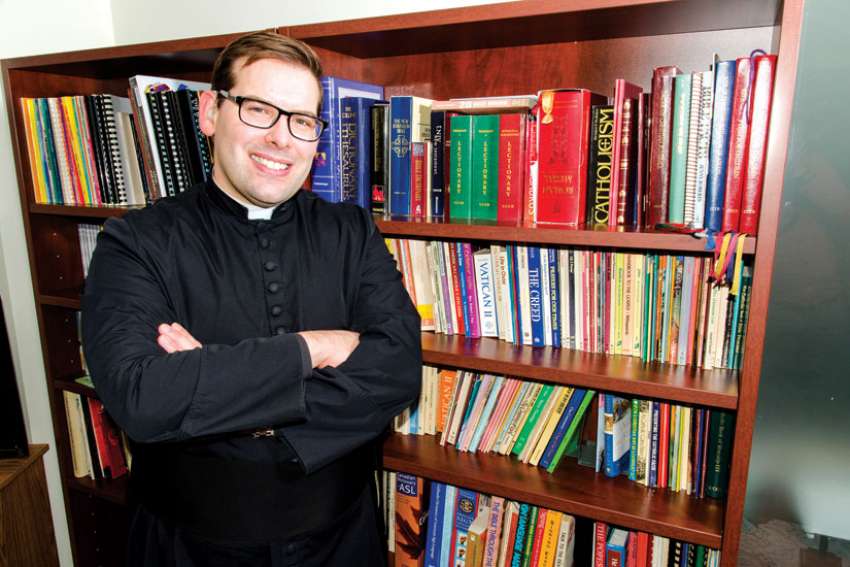Four years later, despite the growth in deaf ministries, he believes much work still remains.
“There is more that could be done,” said Hysell during a recent visit from Edmonton to participate in several events with Archdiocese of Toronto’s deaf ministry.
“If you look at what other groups have done for the deaf community, like the Jehovah Witnesses, they are far ahead of the game than where we are in providing Scripture stories in sign language for example. The Mormons are in some ways as well.”
The Archdiocese of Toronto serves about 250 practising deaf Catholics and “we are slowly evangelizing as there are many more out there,” said Carol Stokes, co-ordinator of deaf ministry for the archdiocese.
One of those initiatives was welcoming Hysell to speak with clergy for the deaf and hearing impaired, as well as visit several schools.
“We need to get outside of this idea of maintaining the deaf Catholic community and grow it,” Hysell said. “Deaf souls are worth saving.”
Hysell’s passion for the ministry comes from a personal journey. Born in Grand Rapids, Mich., he lost his hearing at the age of 18 months following experimental treatment for spinal meningitis.
Though his family was Baptist, Hysell was drawn to Catholicism at an early age and began the process of conversion when he was 13, with priesthood already on his mind.
However, Hysell quickly discovered there was a gap in outreach by the Catholic Church when it came to the deaf community, which traditionally was served by religious communities, whose numbers were dwindling.
“I had no concept of deaf ministry,” he said.
As Hysell advanced through his studies and eventually through the seminary, overcoming obstacles further inspired him to focus on deaf ministry.
“I began to see the need to preach and to teach in sign language,” said Hysell.
For his thesis paper at the seminary, Hysell sought to prove that celebrating the Eucharist did not require oral language.
“St. Thomas (Aquinas) said that the power of the words is not in the utterance but in the faith of the Church that it conveys,” he expressed in the paper. “That validates the signing of the consecration.”
On Dec. 7, 2012 Hysell, who praised his local archbishop for supporting his ministry, became Canada’s first deaf priest when he was ordained for the Archdiocese of Edmonton, where he continues to serve in deaf ministry as well as a parish priest.
He wonders why more priests aren’t trained to fluently communicate with the deaf.
“If we send priests to study other languages and other cultures to be minsters to those groups of people why don’t bishops pick priests … to study sign language so they could minister to the deaf?” he asked. “If we’ll send a priest to learn Cree so that he can minister to the First Nations, why don’t we have the same legitimacy to study American Sign Language?”
Another hurdles Hysell sees is the translation of the Mass itself into sign language.
“As it stands, we have an English translation that presupposes the Latin,” he said. “I want to get rid of the English and jump right into Latin because you would avoid getting things lost in translation.”
The Sacrament of Confession also poses complications, which are typically sidestepped by using interpreters, which also help with catechism for the deaf.
Stokes, who has worked with the archdiocese’s deaf for 46 years, said those she serves deeply desire to understand their faith.
“When we do the readings for Mass they really want to know what it means … (and) they want to understand and receive the sacrament of Confession,” she said. “They’re so hungry to learn their faith.”
Each week Stokes schedules a signing interpreter for Mass at St. Stephen Chapel in downtown Toronto as well as three other parishes.
Karen Wheeler says being able to follow the Mass in sign language through the St. Francis De Sales Chaplaincy has strengthened her faith.
“I don’t understand lip reading, but when I see someone signing I feel more connected,” she said through a translator. “(Since) I’ve found the St. Francis groups I’ve really felt my faith grown.”
Fellow ministry member Rodolfo Chow came to Toronto from Mexico in 1990 hoping to find a greater sense of outreach for the deaf.
“In Mexico there was nothing for deaf Catholics,” said Chow, through a translator. “All I saw was people talking and I didn’t understand anything. I felt left out, but when I came to Toronto and I saw people that could sign I immediately felt part of their community.”
Along with helping them understand the Mass and sacraments Stokes schedules day trips to events like the annual Lift Jesus Higher Rally, Bible study classes and yearly retreats specifically for the deaf.
“Basically anything that the deaf are wanting we try to accommodate them,” Stokes said.


